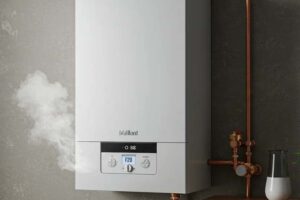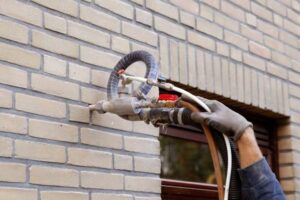Table of Contents
It’s very important to choose the best boiler if you want to heat your large home efficiently. What you choose can affect how comfortable you are and how well your home heats. In this blog, we’ll take you on an interesting journey through the different boiler options you can access, all with the goal of making sure you live in a comfortable and energy-efficient space.
We’re here to help you whether you want to install a combi boiler, a new central heating system, a hot water tank, a regular boiler or a system boiler. Careful analysis is needed to make the right choice, and this part aims to make that process easier. You’ll learn useful things that will make your decision-making easier if you read this whole guide.
Recommended Boilers for Large Homes
- Worcester Bosch Greenstar CDi
- Vaillant ecoTEC plus 938 combi
- Ideal Vogue Max C40
- Worcester Bosch Greenstar 8000 Life 50
- Vaillant ecoTEC Plus 630
- Ideal Vogue Max S32
- Baxi Platinum Plus 32
- Ideal Logic Max Heat H30
- Vaillant ecoTEC plus 430
Explore the Types of Boilers for Larger House
There are three types of boilers: combi, system, and regular/conventional boiler. Let’s explore the functionality of each boiler and find out which is the best boiler for a large house.
System boilers are often the best choice for larger homes. They can handle the higher needs of warmth and hot water without any problems. You can also use a regular boiler if you have enough room for the barrels and tanks they need. A combi boiler is also a great way to save room.
System Boilers
System boilers are great for large homes because they are efficient and can heat a lot of water. They can easily handle multiple bathrooms and boilers, making sure that the heating and hot water always work.
Advantages
A system boiler is recommended for high hot water demands and for large central heating systems. Suitable boiler for a large household.
Disadvantages
The additional cylinder ( hot water storage tank) can take up a significant amount of room, which might be a limitation in larger properties where space is already at a premium.
Regular Boilers for Larger Home
Even though regular boilers can be used in bigger homes, they might not always be the best choice. A separate hot water cylinder and cold water holding tank work with a regular boiler, which is also called a conventional boiler. Because of how they are made, they work well in homes with more bathrooms and more hot water needs.
However it’s important to keep in mind that having different cylinders and storage tanks can take up a lot of room. In bigger homes, this space restriction might be annoying or limit the ways you can use the room you have.
Also, regular gas boilers work best in homes that already have traditional heating systems because the pipes and tanks for the different cylinders and tanks are already there. If you’re going to do a lot of work on your heating system, you might want to look into other options, such as system boilers or combi boilers, which are easier to use.
Advantages
Regular boilers can heat a lot of water, so they are good for bigger homes with more than one shower. Old heating systems can also work with them.
Disadvantages
On the other hand, they can be harder to install and need more room for storage tanks and hot water cylinders.
Combi Boilers For Larger Houses
If you decide to choose a combi boiler, consider to following:
The size of the combi boiler you need for your large house will depend on many factors, including:
- The number of bedrooms in your home
- The size of your cylinder ( hot water tank)
- The number of people living in your home
- Your average daily domestic hot water usage
Your Heating Requirements
In general, you will need a combi boiler with a larger output for a larger house than a smaller home. A good rule of thumb is to choose a combi boiler with an output of at least 24kW for a large house with 4 or more bedrooms.
If you have a very large house or a high demand for hot water, you may need a large combi boiler with an output of 30kW or more. It is important to consult a qualified boiler installer to determine the exact size of combi boiler you need for your home.
Advantages
Space Efficiency, Fast Hot Water, Energy Efficiency, and Cost Savings.
Disadvantages
Water pressure can be affected if multiple taps or showers are used to supply hot water simultaneously. Limited Output: Combi boilers may struggle to meet hot water demands in larger homes. The same boiler provides heating and hot water, which might affect hot water availability during heating cycles.
What are the Key Benefits of Choosing a Larger Combi Boiler for Larger House?
For heating your large home, getting a larger combi boiler can help in many ways, ensuring the best heat and efficiency.
Enhanced Heating Capacity
A larger combi boiler produces more heat, accommodating your house’s larger size. This ensures fast, comfortable heating even in winter. Large combi boilers are over 40KW.
Efficient Hot Water Supply
A larger combi boiler increases the hot water output. This lets several restrooms and taps be utilised without affecting storage hot water, pressure, or temperature. In a large family with several people, this is crucial.
Zoning Capabilities
Many larger combi boilers have complex zoning controls. These controls let you divide your home into heating zones and customise their temperatures. This control improves comfort and saves energy.
Reduced Waiting Time
Extended pipe lengths may delay hot water delivery. A larger combi boiler can produce and supply hot water faster, reducing waiting time and water waste.
Energy Efficiency
Larger boilers aren’t usually less efficient. Advanced technology maximises energy in modern boilers. Choose models that can “modulate,” or adjust their heat output to meet demand. This assures efficient operation and lowers natural gas and bill costs.
Future-Proofing
Buying a larger combi boiler allows for expansion. A boiler with a bigger capacity can handle growing heating demands without replacing it if you add rooms or additions.
Advice for Choosing the Right Boiler
Calculate Your Heat Load
Consult one of our heating engineers about how to determine your home’s heat load. This will help you choose the right boiler size by examining things like the size of the radiators, the amount of heat lost in the room, the insulation, the windows, and the weather.
Consider Hot Water Needs
Think about your hot water consumption habits. If you have multiple bathrooms, a larger hot water supply will be essential.
Efficiency Ratings
Look for boilers with high efficiency. Ask our engineers, and we will help you out.
Maintenance and Servicing
Larger boilers may require more maintenance due to their heavy workload. Ensure you have a maintenance plan to keep the boiler running efficiently.
Conclusion
In conclusion, getting a bigger combi boiler for your large home is the smart thing to do for comfort, hot water efficiency, and future ease. Enjoy the comfort and dependability that a bigger boiler can give you.
Moreover, large families who want to get the most out of their central heating need to make sure they have a well-set up heating control and hot water system.




